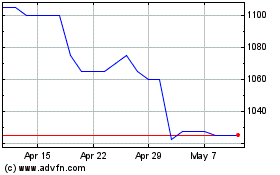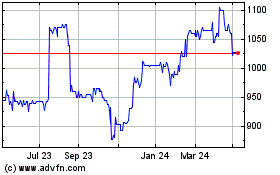By Avantika Chilkoti and Joanne Chiu
Global stocks recovered ground Wednesday, while crude prices
briefly dropped to multidecade lows before oil markets calmed.
Futures linked to the S&P 500 advanced 1.4%, suggesting U.S.
shares could rally on Wednesday. The benchmark Stoxx Europe 600
index climbed almost 1.2%. In Asia, Japan's Nikkei 225 closed 0.7%
lower, while benchmarks in Hong Kong, South Korea and Shanghai
ended higher.
"The psychology is 'buy on the dip' and that's what's fueling
this bear-market rally," said Gregory Perdon, co-chief investment
officer at private bank Arbuthnot Latham. Some fund managers only
have experience investing in the prolonged bull market of the past
decade, and have grown to expect a quick rebound, he said.
"The disappointment when that wall of unemployment does not
dissipate quickly will be a rude awakening for risk assets,
especially the equity market," Mr. Perdon said.
Investors are looking to corporate earnings to gauge the health
of U.S. businesses as a broad swath of blue-chip companies report
their results.
Ahead of the opening bell, shares in Snap soared almost 20%. The
social-media company reported a surge in the number of users as
people who are homebound turned to its chat app for communicating
with friends and family.
Expedia climbed over 4% in offhours trading after The Wall
Street Journal reported the company is in advanced talks to sell a
stake to private-equity firms as widespread travel bans hit the
online-booking company's business.
Shares in Netflix ticked down 3.2% in offhours trading. The
streaming giant on Tuesday evening said it ended the first quarter
with nearly 16 million new subscribers.
In commodities, Brent crude, the global gauge for oil, was
almost flat at $19.30 a barrel, after briefly plunging earlier in
the day to levels last seen in 1999. The most actively traded U.S.
benchmark for crude ticked down 1.6% to about $11.41 a barrel,
following its lowest close in 21 years.
The ministers of major oil-producing nations didn't reach any
decisions on starting production cuts as soon as possible following
an informal call on Tuesday, according to Warren Patterson, head of
commodities strategy at ING. Meanwhile, forecasts suggest that the
Energy Information Administration's data on Wednesday may show that
the increase in U.S. crude-oil inventories exceeded 10 million
barrels for the fourth consecutive week.
The Trump administration is considering offering federal
stimulus funds to embattled oil-and-gas producers in exchange for
government ownership stakes in the companies or their crude
reserves, The Wall Street Journal reported. But the plan faces long
odds given likely opposition from congressional Democrats to using
stimulus funding for the oil industry. Separately, Texas regulators
on Tuesday deferred a decision on whether to make operators curtail
production for the first time since the 1970s.
Some investors questioned how effective support from the U.S.
government would be in shielding oil producers, or propping up the
price of energy stocks.
"It's not realistic to expect there won't be any casualties from
this type of move in the oil price," said Hugh Gimber, global
market strategist at J.P. Morgan Asset Management. "If you do see
government intervention, the pressure on corporates to avoid
dividends and buybacks for a long period of time will be very
strong."
The yield on the 10-year Treasury note inched up to 0.586%, from
0.571% Tuesday, in a sign that risk appetite may be returning.
In Europe, investors continued to pull assets out of government
bonds from the periphery of the eurozone. Concern has mounted over
recent days that a key meeting of European leaders on Thursday is
unlikely to result in agreement on measures like a common
debt-issuance program, which would have allowed richer nations
share in the cost of shielding struggling economies.
"We would call it a defining moment for the eurozone project,"
said Brian O'Reilly, head of market strategy for Mediolanum
International Funds. "This is a crisis that hit all nations
equally: it is not that any nation did anything to bring this on
itself, unlike the run-up of debt in Spain and Italy in the
eurozone debt crisis."
The yield on 10-year Greek bonds climbed to 2.604%, from 2.434%
Tuesday, and to 1.109% on Spanish bonds, from 1.022% Tuesday.
Confidence is likely to remain fragile while analysts and
investors are still slashing profit forecasts for 2020, according
to Ken Peng, head of Asia investment strategy at Citi Private Bank.
He expects global earnings to fall by about 50% this year, but
consensus forecasts are still far from this figure. "The markets
will have more confidence, and more sustainably rally, once this
revision momentum slows down," he said.
Fresh outbreaks in Asia are a warning that secondary waves of
infection -- and intermittent lockdowns -- could follow initial
successes, a pattern likely to continue absent a medical
breakthrough, according to Min Lan Tan, Asia-Pacific head of the
chief investment office at UBS Global Wealth Management.
"Proper economic functioning is probably going to normalize
sustainably only toward the end of this year," Ms. Tan said.
Write to Avantika Chilkoti at Avantika.Chilkoti@wsj.com and
Joanne Chiu at joanne.chiu@wsj.com
(END) Dow Jones Newswires
April 22, 2020 07:36 ET (11:36 GMT)
Copyright (c) 2020 Dow Jones & Company, Inc.
Arbuthnot Banking (LSE:ARBB)
Historical Stock Chart
From Apr 2024 to May 2024

Arbuthnot Banking (LSE:ARBB)
Historical Stock Chart
From May 2023 to May 2024
